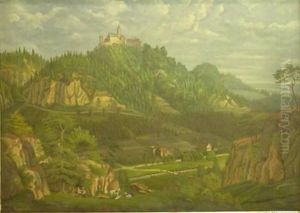Karl Rudolph Kasthofer Paintings
Karl Rudolph Kasthofer was born in 1777 in Bern, Switzerland. His life spanned a significant period in European history, marked by the Enlightenment, the Napoleonic Wars, and the early phases of the Industrial Revolution. While Kasthofer may not be as widely recognized as some of his contemporaries in the arts, his contributions were nonetheless impactful, particularly in the realm of forestry and natural science, a testament to the era's burgeoning interest in understanding and categorizing the natural world.
Kasthofer's early life and education were in line with the expectations of a young man of his standing in Swiss society. He pursued studies that were typical of the time, which likely included the humanities and basic sciences. However, it was his passion for the natural world that defined his career path. Kasthofer became deeply involved in forestry, a field that was gaining prominence due to its economic and environmental significance. Europe's forests were under considerable strain from overuse and mismanagement, and individuals like Kasthofer played a crucial role in advocating for sustainable forestry practices.
Throughout his career, Kasthofer published several works on forestry and natural history, contributing to the growing body of knowledge on sustainable management of natural resources. His efforts were not limited to academia; he also engaged in practical forestry management, applying his theories and findings to the real world. This dual approach helped bridge the gap between scientific research and practical application, a hallmark of the early industrial era's approach to environmental management.
Kasthofer's legacy is perhaps best understood in the context of the broader environmental and scientific movements of his time. While not a household name, his work contributed to the foundational principles of conservation and sustainable resource management, principles that have become increasingly important in our contemporary world. Karl Rudolph Kasthofer passed away in 1853, but his contributions to forestry and environmental science have left a lasting impact, reflecting the Enlightenment's enduring legacy in promoting a rational and systematic understanding of the natural world.
